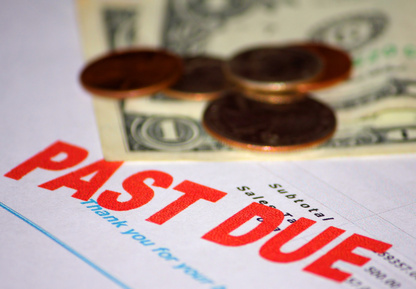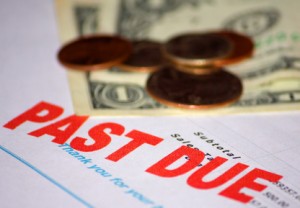 When preparing a case for filing, I typically advise my clients that they should continue doing what they usually do financially speaking. Any change from the status quo tends to look suspcicious. It’s not a good time to make radical financial changes when you know that every move you make might be scrutinized. Sometimes, however, there is a circumstance or situaiton which we can see is going to create a problem if a bankruptcy is filed. When one has a situation like that, the question is whether something should be done to change things; or would it be best just to leave it alone. The ways and means of changing such things in such a way that the situation actually is made better instead of worse is known in my world as “bankruptcy planning.”
When preparing a case for filing, I typically advise my clients that they should continue doing what they usually do financially speaking. Any change from the status quo tends to look suspcicious. It’s not a good time to make radical financial changes when you know that every move you make might be scrutinized. Sometimes, however, there is a circumstance or situaiton which we can see is going to create a problem if a bankruptcy is filed. When one has a situation like that, the question is whether something should be done to change things; or would it be best just to leave it alone. The ways and means of changing such things in such a way that the situation actually is made better instead of worse is known in my world as “bankruptcy planning.”
Recent court decisions indicate that some modest planning prior to filing a bankruptcy is permitted. But if you go too far with it, you risk all sorts of problems. So where’s the line? Well, it’s much more of an art than a science. I like to think I know it when I see it, but laying down hard and fast rules that will apply in every case would be hard to do. Before making any planning moves at all, if you have bankruptcy in mind, please get yourself face to face with a competent lawyer. I really hate it when my first meeting with a potential client comes a week after that person made a big mistake. I can’t count the times that I have said “I wish you would have come to see me before you did that.” In this blog post the best I can do is make a few general suggestions, things that would usually be correct, but not necessarily always correct.
FIRST, WHATEVER ELSE YOU DO, QUIT USING CREDIT CARDS
The newer the debt is, the more likely it is that there could be a problem getting it discharged in bankruptcy. If you are contemplating bankruptcy, using a credit card can be considered – I hate to use this word – fraud. The creditor may make a claim, usually as part of an adversary proceeding in the bankruptcy court, that you knew or should have known that you were never going to be able to repay the debt. Worse yet, the creditor might claim that you flat out intended to never repay. Any use of one account that totals over $500 or so within the 90 days before filing can bring on an objection from a creditor; under the 2005 law this is a circumstance that is presumed to be objectionable. Large purchases or charges or balance transfers within six months or so prior to filing also tend to draw an objection. Purchases or charges that took place more than six months prior to filing are not quite so likely to be objected to, but each circumstance is different.
When I am getting a case ready to file, I try to screen for transactions that might result in this kind of objection. If it looks to me that an objection is likely, a delay in filing is usually the solution. If the case is filed and an objection is actually filed, I may have to refer my client to an attorney who specializes in defending that kind of case. The retainer agreement I use specifically states that defending adversary proceedings is not included in what I am hired to do. Sometimes I can settle such a claim without referring my client to somebody else. There are also situations where my advice might be that there is no use defending because the case is a sure loser. An example of a sure loser would be a claim for overpayment of unemployment benefits. If a person accepted such benefits while they had a job, there is probably no way to defend. If it’s the kind of claim that just isn’t going to go away, often I can help my client negotiate a payment plan.
Sometimes the best solution is to file a Chapter 13 instead of a Chapter 7. In a Chapter 13 the creditors are discouraged from bringing nondischargeability claims because even if they win, they can’t collect on their win until after the end of the five year payment plan. During the five years they can’t collect any more than their share of what is being paid under the Chapter 13 plan. Some Chapter 13 plans provide for very low payments. Chapter 13 might not be as hard to live with as one might imagine.
DON’T TRANSFER, GIVE AWAY OR TRY TO HIDE ANYTHING
The bankruptcy statute has what is called a fraudulent transfer provision in it which goes back two years. Besides that, the State of Minnesota has a fraudulent transfer statute that goes back six years. These statutes allow the bankruptcy trustee to reverse certain transfers. The transfer reversal is often called a “claw back.” The problem is that there is a temptation prior to bankruptcy to get rid of assets so that the bankruptcy trustee can’t take them. Whatever form the transfer takes, if it was transferred as a gift or sold for less than full value, this property can be taken from it’s new owner. The two year bankruptcy statute covers just about any transfer that was for less than full value. This can include a transfer, or it can also include taking your name off a jointly owned asset. After all, when you take your name off a joint asset, you transfer half to the other owner. The six year Minnesota state statue has a requirement that the transfer have been for the purpose of hindering or delaying creditors, which means that after the first two years it is harder to show that a transfer was fraudulent. The bankruptcy forms you will have to submit ask a lot of questions about what you have sold, transferred or given away in the past two years. Selling something for fair market value is OK, but be ready to document that it was in fact fair value. The forms will ask what the item was, who it was transferred to and what you got in exchange.
“I don’t know” is not an acceptable answer to questions about where your money or assets went. The bankruptcy statute requires that before you file you must keep records sufficient to determine your financial circumstances. One of the things I often tell people who are contemplating bankruptcy is that they should start keeping receipts for everything. Receipts are especially important if you are using cash. We need to be able to explain where all your money went over the past several months before you file your case; and in some instances we have to disclose things that happened years earlier. My personal preference is that my clients run all their finances through a checking account, so there is a good record of everything that happened. There’s no rule agains using cash for everything, but I am always afraid that it looks suspicious.
If you have an account for your child into which you have been depositing funds on a regular basis, stop doing that. If you were thinking of giving your boat or your Harley Davidson to your brother or selling it to him for one dollar, don’t do it. If you have been repaying a debt to a relative, stop making those payments. Repayments of debt to a relative within one year of filing can be clawed back. Repayments to a regular unsecured creditor within 90 days of filing can also be clawed back if the total repayment duing that time is $600 or more. You might love your doctor, dentist, orthodontiist, therapist or chiropractor, but trying to get them paid off before filing the bankruptcy can be a wasted effort.
If someone recently gave you something which you are thinking of giving back, don’t do it. There’s nothing I hate more than having a bankruptcy trustee be able to seize an asset from a relative or friend of my client, when it happens that it was an asset that my client could have claimed as exempt and kept without a problem.
BE CAREFUL WHEN SELLING ASSETS AND SPENDING THE MONEY
As I suggested above, please don’t read this and then assume you know what to do. Consult a competent lawyer before you take action.
It’s not unusual for someone to come in to my office who has an extra car that can’t be exempted in a bankruptcy case, or some other non-exempt asset such as a boat or motorcycle. It there is a loan against the item, the easy answer might be to surrender it back to the lender. If there is equity in the item, selling it might not be a bad idea. As I mentioned above, with any sale the buyer’s name and address, the item itself, the date and the price must all be listed on the bankruptcy petition. In the event that it was something you listed on Craigslist and sold to a person who came by and did not identify himself or herself, I have gotten by with listing the buyer as “Unidentified purchaser from Craigslist.” When selling an item, you must be able to swear that the price was the fair market value. Usually such values are fairly easy to document with a visit to Craigslist or Ebay. It helps if the buyer was somebody you didn’t know rather than a friend or relative.
Of course when you sell something, what you have then is cash. Cash on hand – that is money that is not in the bank – still has to be listed as an asset in the bankruptcy petition. In my experience having too much cash tends to just not be as big a problem as a having hard asset item like a motorcycle that can’t be claimed as exempt. If there is too much cash, there may be acceptable ways in which it can be spent. One of my favorite bumper stickers says “MONEY TALKS, BUT MINE ONLY KNOWS HOW TO SAY GOODBYE.” Most of my clients are in such dire financial circumstances that their cash can be compared to spit in a hot frying pan. It just doesn’t last long. Typically they need dental work, or their children need dental work, but they have been putting it off. I’ve also had clients who were delaying needed surgery, because they were using what funds they had to try and keep up with credit card payments. Another needed expense that gets put off is car repairs. This can include needed new tires or needed brake work. I’ve had clients living without hot water because they couldn’t afford a new water heater. Others are in serious need of a new refrigerator or dishwasher. Please consult your lawyer first, but often times purchases of such things are considered entirely appropriate because they are necessities of life. Buying needed clothing, groceries and filling up the cars with gas is usually also considered to be entirely acceptable. Paying your lawyer of course is always a good idea.
CONCLUSION
As I said above, this is more of an art than a science. It is very hard to state hard and fast rules that will work every time. Something that might work fine in one case can cause a very serious problem in another. Each case different. Variables abound. The bankruptcy statute is a mine field of “gotchas.” Whatever you may be contemplating when it comes to planning a bankruptcy, don’t do it until after you thoroughly discuss it with your lawyer. And when it comes to choosing a lawyer, I suggest you find somebody who has been around for a while.
Disclaimer
This blog post is for general information purposes only and does not create an attorney-client relationship. It is not legal advice. Please consult the attorney of your choice concerning the details of your case. I am a debt relief agency helping people file for relief under the federal bankruptcy code.
























